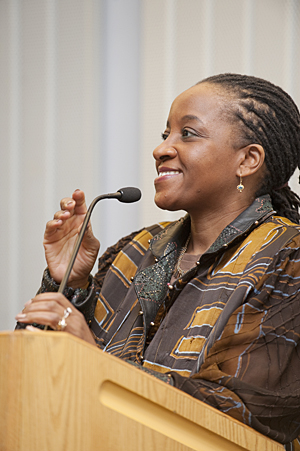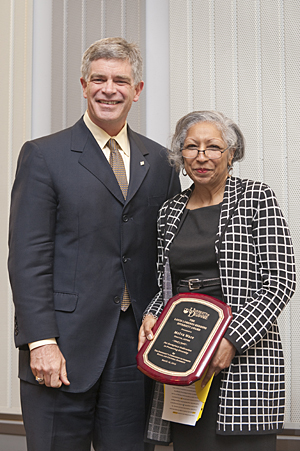

ADVERTISEMENT
- Rozovsky wins prestigious NSF Early Career Award
- UD students meet alumni, experience 'closing bell' at NYSE
- Newark Police seek assistance in identifying suspects in robbery
- Rivlin says bipartisan budget action, stronger budget rules key to reversing debt
- Stink bugs shouldn't pose problem until late summer
- Gao to honor Placido Domingo in Washington performance
- Adopt-A-Highway project keeps Lewes road clean
- WVUD's Radiothon fundraiser runs April 1-10
- W.D. Snodgrass Symposium to honor Pulitzer winner
- New guide helps cancer patients manage symptoms
- UD in the News, March 25, 2011
- For the Record, March 25, 2011
- Public opinion expert discusses world views of U.S. in Global Agenda series
- Congressional delegation, dean laud Center for Community Research and Service program
- Center for Political Communication sets symposium on politics, entertainment
- Students work to raise funds, awareness of domestic violence
- Equestrian team wins regional championship in Western riding
- Markell, Harker stress importance of agriculture to Delaware's economy
- Carol A. Ammon MBA Case Competition winners announced
- Prof presents blood-clotting studies at Gordon Research Conference
- Sexual Assault Awareness Month events, programs announced
- Stay connected with Sea Grant, CEOE e-newsletter
- A message to UD regarding the tragedy in Japan
- More News >>
- March 31-May 14: REP stages Neil Simon's 'The Good Doctor'
- April 2: Newark plans annual 'wine and dine'
- April 5: Expert perspective on U.S. health care
- April 5: Comedian Ace Guillen to visit Scrounge
- April 6, May 4: School of Nursing sponsors research lecture series
- April 6-May 4: Confucius Institute presents Chinese Film Series on Wednesdays
- April 6: IPCC's Pachauri to discuss sustainable development in DENIN Dialogue Series
- April 7: 'WVUDstock' radiothon concert announced
- April 8: English Language Institute presents 'Arts in Translation'
- April 9: Green and Healthy Living Expo planned at The Bob
- April 9: Center for Political Communication to host Onion editor
- April 10: Alumni Easter Egg-stravaganza planned
- April 11: CDS session to focus on visual assistive technologies
- April 12: T.J. Stiles to speak at UDLA annual dinner
- April 15, 16: Annual UD push lawnmower tune-up scheduled
- April 15, 16: Master Players series presents iMusic 4, China Magpie
- April 15, 16: Delaware Symphony, UD chorus to perform Mahler work
- April 18: Former NFL Coach Bill Cowher featured in UD Speaks
- April 21-24: Sesame Street Live brings Elmo and friends to The Bob
- April 30: Save the date for Ag Day 2011 at UD
- April 30: Symposium to consider 'Frontiers at the Chemistry-Biology Interface'
- April 30-May 1: Relay for Life set at Delaware Field House
- May 4: Delaware Membrane Protein Symposium announced
- May 5: Northwestern University's Leon Keer to deliver Kerr lecture
- May 7: Women's volleyball team to host second annual Spring Fling
- Through May 3: SPPA announces speakers for 10th annual lecture series
- Through May 4: Global Agenda sees U.S. through others' eyes; World Bank president to speak
- Through May 4: 'Research on Race, Ethnicity, Culture' topic of series
- Through May 9: Black American Studies announces lecture series
- Through May 11: 'Challenges in Jewish Culture' lecture series announced
- Through May 11: Area Studies research featured in speaker series
- Through June 5: 'Andy Warhol: Behind the Camera' on view in Old College Gallery
- Through July 15: 'Bodyscapes' on view at Mechanical Hall Gallery
- More What's Happening >>
- UD calendar >>
- Middle States evaluation team on campus April 5
- Phipps named HR Liaison of the Quarter
- Senior wins iPad for participating in assessment study
- April 19: Procurement Services schedules information sessions
- UD Bookstore announces spring break hours
- HealthyU Wellness Program encourages employees to 'Step into Spring'
- April 8-29: Faculty roundtable series considers student engagement
- GRE is changing; learn more at April 15 info session
- April 30: UD Evening with Blue Rocks set for employees
- Morris Library to be open 24/7 during final exams
- More Campus FYI >>
8:05 a.m., March 22, 2010----Nontombi Naomi Tutu, educator and human rights activist, says she believes that differences among people based on appearance are not an excuse for divisiveness, whether at the local, national or international level.
Tutu spoke at the annual Louis L. Redding Lecture and Award Program, held Thursday, March 18, in the Trabant University Center.
During the program, Melva L. Ware, director of the ASPIRE program housed in the Delaware Center for Teacher Education, was honored with the presentation of the Louis Lorenzo Redding Diversity Award by UD President Patrick Harker.
Sponsored by the Office of Equity and Inclusion, the Commission to Promote Racial and Cultural Diversity and the Center For Black Culture, the lecture honors the late attorney Louis Lorenzo Redding for his efforts in the advancement of civil rights in Delaware and in America. Redding was the first African-American to be admitted to the Delaware Bar.
Introduced by Francis Kwansa, chair of UD's Commission to Promote Racial and Cultural Diversity, Tutu addressed an audience of about 300 students, faculty and members of the UD community, as well as visitors from Lincoln University.
Speaking on “Truth and Reconciliation: Healing the Wounds of Racism,” Tutu said that when individuals judge others purely on physical attributes, everybody loses.
“I have found usually, when we first walk into a room, we have two views of people, 'us,' and 'them,'” Tutu said. “When we ask people to write down the characteristics of 'us' and 'them,' and to share the list, people are amazed that the 'us' group shares the same characteristics of the 'them' group.”
Tuto, the third child of Archbishop Desmond and Nomalizo Leah Tutu, noted that although differences exist, the truth lies somewhere between those two labels that people place on each other.
“I believe that we have differences,” Tutu said. “The most scary people are those who say they don't see any differences.”
Tutu noted that while adults might deny or feel it is impolite to draw attention to such differences, children are not held back such social conventions.
“Children notice these differences, and they ask questions about them, and while the questions might seem embarrassing, this is how they learn,” Tutu said. “We, the adults, are the ones who teach them that it is wrong to talk about or notice the differences.”
Grown-ups, Tutu added, “need to step back and maybe be more like those children, and to ask what this person is bringing into my world that I didn't have before?”
Drawing on her experiences from living in her native South Africa, as well as America and the United Kingdom, Tutu said that people may view differences either as a means to expand their horizons or they may believe that there is no common ground from which to reconcile the differences they perceive in others.
“I grew up in a society that was based on dehumanizing certain people,” Tutu said. “When such differences are used to divide people, everybody becomes dehumanized.”
In the United States, Tutu said, there is this notion of classifying people as “others,” based on their appearance or their social or economic status.
“When we feel we already know their story, we say we don't have to hear anything from these 'others,'” Tutu said. “When we use the differences that exist among us, it gives us an excuse not to listen, and this becomes an explanation or validation of oppression. What we are saying is that the 'others' are not quite as human as we are. ”
In mentioning a book in progress with a working title of I Don't Think of You as Black: Honest Conversations on Race and Racism, Tutu recalled how the effort grew out of her first meeting with coauthor Rose Bator, with whom she presents a Building Bridges workshop to deal with issues of race and racism.
“My coauthor made that comment 'I don't think of you as black,' when we were starting out. I counted to 10 and said, 'What do you mean you don't think of me as black?'” Tutu recalled. “That started a conversation 10 years ago that has continued to this day.”
Tutu said she believes such conversations are critical if people are to move forward by admitting the impact of racism and sexism in their lives and on their world.
“It is only when we start paying attention to these voices and start challenging ourselves, that we can be on the path of ending this idea of 'others,'” Tutu said. “Once we are challenged by these voices we can accept our differences as opportunities and as a blessing, a chance for each of us to learn and grow and be a unique part of a special home.”
During a question and answer period following her talk, Tutu advised concerned individuals to seek out the support of others in addressing issues, including racism and human rights violations.
“It is very hard to do these things on your own,” Tutu said. “The most important thing is to find a support network, with people as committed as you are to combat what the 'ism' is.”
On the issue of racial reconciliation both in South Africa and the United States, Tutu said, “It is an ongoing struggle. It is a hard thing, to forgive, but being able to forgive can be a freeing experience, to be able to let go.”
Melva L. Ware honored Redding Diversity Award
In presenting the award to Ware, Harker noted that it recognizes those whose diversity-related efforts have led to significant changes in the campus climate and composition of the University.
“Dr. Ware's work has changed both, climate and composition,” Harker said. “But, essentially, her work is about something even more fundamental. She changes lives.”
Harked cited Ware's efforts in revitalizing the Academic Support Program Inspiring Renaissance Educators (ASPIRE) program. Established in 1991, ASPIRE continues to support access for members of underrepresented groups to University of Delaware degree programs, with an emphasis on preparing students for careers as teachers and educators.
“The valuable program was languishing, until Dr. Ware took it over,” Harker said. “She assumed the position with a strong vision, a spirit of collaboration and all the skills and attributes of an extraordinary leader.”
Describing her as a powerhouse, Harker said Ware is willing to do anything to get talented students into UD programs, particularly students who might not otherwise have the opportunity or inclination to attend college.
“All this is just the latest chapter in a life dedicated to helping children fulfill their potential, a potential they might never had been shown had it not been for her caring, her mentoring and her leadership,” Harker said. “Prof. Ware, on behalf of all those who have been inspired by you, mentored by you, helped by you -- for all those in college because of you, and those who one day will be, I offer you my sincere gratitude.”
Following a standing ovation, Ware noted it was an honor to be recognized in the spirit of Louis L. Redding and Thurgood Marshall and their courageous colleagues, who, Ware said, “insisted that UD and America abandon apartheid.
Ware also cited the spirit of the Tutu and Mandella families and Martin Luther King, who challenged the nonsense of economic and racial separation by insisting that our human future is intertwined.
“The world only makes sense in the community. The human spirit is ignited or extinguished there,” Ware said. “So, it is right to connect the work of our college and its programs to ignite without question the best in all of us. Thank you very much for this award. I accept this on behalf of those who made it possible.”
A reception was held following the event.
Article by Jerry Rhodes
Photos by Evan Krape


